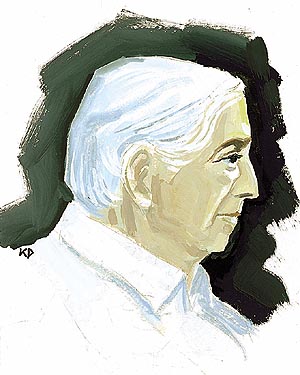ABOUT ninety years ago, the founders of the Theosophical Society, Dr. Annie Besant and Charles W. Leadbeater were on the lookout for a 'messiah' or 'World Teacher'. During their travels around the then Madras Presidency, they spotted a skinny little boy playing on a beach along with his friends. The boy's countenance had a mesmerising effect on them, and they were sure they had  found their 'messiah'. They adopted the boy, groomed him, and gave him the best education possible. Years later in 1929, when the Theosophical society was ready to announce the new messiah, Jiddu Krishnamurti shocked the Society and the rest of the world by refusing to play the role. Albeit disappointed by his refusal, the Theosophical Society did not disown him. In fact he had a very close relationship the Dr. Besant right until the end.
found their 'messiah'. They adopted the boy, groomed him, and gave him the best education possible. Years later in 1929, when the Theosophical society was ready to announce the new messiah, Jiddu Krishnamurti shocked the Society and the rest of the world by refusing to play the role. Albeit disappointed by his refusal, the Theosophical Society did not disown him. In fact he had a very close relationship the Dr. Besant right until the end.
The emerging of Krishna-murti's teachings during the troubled twenties effectively challenged and shocked many. He travelled from place to place speaking to people, but during the years of the Second World War he remained in Ojai, Calfornia. It was only in 1947, just two months after Independence, that he returned to India and stormed into the hearts of the young with his unconventional philosophy.
Krishnaji or 'K', as he was af-fectionately called, did not be-lieve in rituals, conventional re-ligion, and even the guru-shishya tradition. 'Meditation is not a search; it is not a seeking, a probing, an exploration. It is an explosion and discovery. It's not the taming of the brain to conform nor is it a self-introspective analysis. . . . Meditation is the emptying of consciousness, not to receive, but to be empty of all endeavour. There must be space for stillness, not the space created by thought and its activities but that space that comes through denial and destruction, when there is nothing left of thought and its projection. In emptiness alone can there be creation.'
Unlike many saints who en-courage their disciples to revere them, touch their feet, worship them, Krishnaji strongly forbade disciples to cling to him: 'I have affection for people. But I say, don't get attached to me, as I am like the wind; you can't hold it.' And like the wind he remained to the end of his life – defying all efforts to declare him a guru, saint, or messiah.
http://www.tribuneindia.com/2000/20000109/spectrum/main2.htm
No comments:
Post a Comment